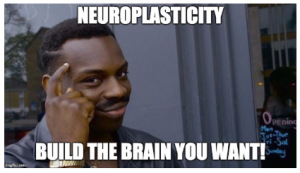Expertise
This is a response for week seven in 6411 Cognition and Learning. The topic is ‘expertise’.
I would hazard a guess that I am an expert in educational technology, but more specifically in media and digital literacies as applied to digital storytelling. I’m not genetically predisposed to this specific area, but I’ve put in the ten-year minimum required time and can sustain attention to a specific task for long periods of time. I’ve watched and learned from experts in the field, practiced the craft, have automated many procedures, can see beyond surface structures, intuitively make decisions, can act quickly, yet I will readily accept errors as inherent to the process (Harteis & Billett, 2013; Jarvis, 2015; Kulasegaram, Grierson & Norman, 2013; Merrienboer & Sweller, 2005; Willingham, 2009).
I am not an expert in coding, 3D printing or operating a drone. Put a controller in my hands and I am definitely a novice. The cognition required for operating a drone is not something in which I’ve acquired background knowledge or practice. I would dread the skull-cap readings should I be tested in this area (CBC Quirks & Quarks, n.d.). While these skills fall under the educational technology umbrella, I have no schemata for coding or drone operation. I wouldn’t be activating my primary motor function for this activity (CBC Quirks & Quarks, n.d.). So, even though I claim expertise in a domain of knowledge, there may be areas for which I am cognitively ill equipped.
Willingham (2009) suggests that experts build new knowledge through understanding. Merrienboer & Sweller (2005) posit that expertise develops when complex schemata are used to organize and store knowledge. Jarvis (2015) states that expertise is part assimilation and part intuition. The knowledge I apply to digital storytelling or digital literacy is tacit and intuitive. I’ve developed skills and fluencies, facilities and capacities that “permit openness and flexibility in their execution” which allow me to see the scope of possibilities (Harteis & Billett, 2013, p. 155). These are not the same skills or fluencies I apply to coding activities. With coding, I have yet to move through the levels from novice to advanced beginner as I access information. I am nowhere near being competent or proficient as I build knowledge. I cannot integrate or internalize information as an expert (CAST, 2018; Jarvis, 2015; Skillen, 2014).
 As a novice coder, just as students who are novice learners, I build understanding as I learn, tinker, and create. What I create may not be new knowledge, in terms of a global bank of knowledge creation, but it is new to me, to others who may be working with me, or to those who read about my work. Individual differences in how I’ve collected information into long term memory can result in intuitive flashes of perception in novel ways, even as a novice (Kulasegaram et al., 2013). As a novice learner in coding, my expertise in digital literacies can inform my practice as I transfer knowledge and build abstract concepts through practice, but I’m certainly not going to put this to the test, as suggested on the CBC Quirks & Quarks podcast.
As a novice coder, just as students who are novice learners, I build understanding as I learn, tinker, and create. What I create may not be new knowledge, in terms of a global bank of knowledge creation, but it is new to me, to others who may be working with me, or to those who read about my work. Individual differences in how I’ve collected information into long term memory can result in intuitive flashes of perception in novel ways, even as a novice (Kulasegaram et al., 2013). As a novice learner in coding, my expertise in digital literacies can inform my practice as I transfer knowledge and build abstract concepts through practice, but I’m certainly not going to put this to the test, as suggested on the CBC Quirks & Quarks podcast.
References
CAST (2018). Universal Design for Learning Guidelines version 2.2. Retrieved from http://udlguidelines.cast.org
CBC Quirks & Quarks. (n.d.). Canada’s newest Nobel laureate, reading surgeons’ minds, sniffing out shark water, a moon in an alien solar system and women and autism under diagnosis. Retrieved from https://podcast-a.akamaihd.net/mp3/podcasts/quirksaio-THyuYkFP-20181005.mp3
Harteis, C. & Billett, S. (2013). Intuitive expertise: Theories and empirical evidence. Educational Research Review, 9, 145-157.
Jarvis, P. (2015). Learning expertise in practice: Implications for learning theory. Studies in the Education of Adults, 47(1), 81-94.
Kulasegaram, K. M., Grierson, L., & Norman, G. (2013). The roles of deliberate practice and innate ability in developing expertise: Evidence and implications. Medical Education, 47, 979-989.
Merrienboer, J. & Sweller, J. (2005). Cognitive load theory and complex learning: Recent developments and future directions. Educational Psychology Review, 17(2), 147-177.
Skillen, P. (2014, September). Novice vs. expert learners. [web infographic]. Retrieved from https://inquiryblog.files.wordpress.com/2014/09/noviceexpertinfographic-825w.jpg
Willingham, D. T., (2009). Why don’t Students Like School? A Cognitive Scientist answers questions about how the mind works and what it means for the classroom. San Francisco, CA: Jossey-Bass.
